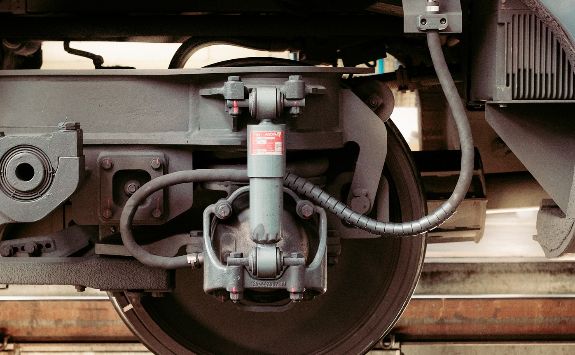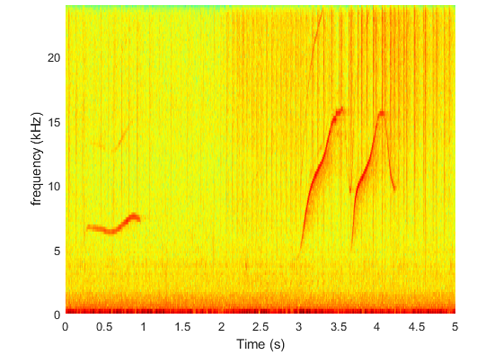Sensor systems
Advanced sensing technology for challenging environments.
Our research focuses on the design and development of:
- novel sensors
- sensor arrays
- non-destructive testing and evaluation
- structural health monitoring
- Internet of Things
We develop hardware, software and signal/image processing algorithms for applications in:
- railways
- pipelines
- aerospace
- marine environment and infrastructure
- medicine, including non-invasive diagnostics and healthcare

Non-destructive Testing
We have extensive experience in the field of electromagnetic non-destructive testing and evaluation. We have developed new inspection methods and novel feature extraction techniques. We work across all aspects of electromagnetic NDE. We investigate defect detection and characterisation. We develop techniques to quantify macro- and micro-structural changes in components of railways, pipelines, aerospace, offshore wind turbine blades.
We recognise the urgent need for fast, accurate, practical and non-destructive inspection requirements from our industry partners. These include global names like Airbus, British Steel, and General Electronics.
.jpg)
We are a pioneer among NDT research labs in the digital age. We develop accurate, effective, efficient analytical and numerical models. We investigate multi-physics phenomena with multiple parameters and complexities. We use complex non-destructive testing evaluation conditions.
We apply state-of-the-art NDT & E techniques. These include:
- pulsed eddy current
- eddy current pulsed thermography
- microwave near and far-field inspection for material characterisation
- structural integrity
- defect (crack, fatigue, corrosion, delamination) detection and identification
- stress and lifecycle assessment for safety-critical components and systems in the areas of defense, energy, transport, aerospace, oil and gas, and infrastructure
Subsea Passive Acoustic Monitoring (PAM)
The SEAlab team develops hardware, software and signal processing algorithms to autonomously detect underwater acoustic signatures from marine mammals (e.g. dolphins) and propulsion noise from surface and subsea vehicles. We specialise in computationally light detection algorithms that can run on very low cost and low power devices (edge computing) for long periods at sea. These devices report detection data in real time via wireless terrestrial, satellite or underwater acoustic communication networks, achieving practical examples of the Internet of Underwater Things (IoUT).
Recent examples of this are live dolphin click (echolocation) and whistle (calls) detectors currently operating in the North Sea. These devices are installed in the North Sea and detect clicks/whistles emitted by animals within a radius of up to 3km of the device. Information on detected click trains or whistles is transmitted back to shore and displayed live on a web interface.
Dolphin Click trains are displayed with inter click interval (ICI), with low ICI values indicating rapid click trains and feeding activity, and magnitude, which gives an broad indication of the distance from the detector. Dolphin whistles are displayed in terms of frequency gradient and magnitude and a time-frequency plot appears for a subset of detected whistles allowing the recurring "signature" whistles to be identified.
Autonomous PAM devices developed by the team have proven the ability to operate for up to 6 months at sea without maintenance, with only a small battery capacity of 4 x 1.5V akaline C cells.
Examples of live data can be seen here.

Selected papers
- Tian GY, Gao YL, Li KJ, Wang YZ, Gao B, He YZ. Eddy Current Pulsed Thermography with Different Excitation Configurations for Metallic Material and Defect Characterization. Sensors 2016, 16(6), 843.
- Tian GY, Gao YL. Multiphysics Integrated NDT&E and Progress on Eddy Current Pulsed Thermography. In: 20th International Workshop on Electromagnetic Non-Destructive Evaluation (ENDE). 2016, Sendai, Japan: IOS Press.
- Gao Y, Tian GY, Wang P, Wang HT, Gao B, Woo WL, Li KJ. Electromagnetic pulsed thermography for natural cracks inspection. Scientific Reports 2017, 7: 42073.
- Li K, Tian GY, Cheng L, Yin A, Cao W, Crichton S. State detection of bond wires in IGBT modules using eddy current pulsed thermography. In: IEEE Transactions on Power Electronics 2014, 29(9): 5000-5009.
- Liang T, Ren W, Tian GY, Elradi M, Gao Y. Low energy impact damage detection in CFRP using eddy current pulsed thermography. In: Composite Structures 2016, 143: 352-361.
Selected projects
- Bridge the gap of theoretical and experimental eddy current NDT (EP/E010458/1)
- Pulsed eddy current stimulated thermographic NDE (EP/F023324/1)
- EPSRC IAA Phase 2 project: 3D super-fast and portable eddy current pulsed thermography for railway inspection (EP/K503885/1)
- H2020 Marie Skłodowska-Curie European Training Network
Health Monitoring
We are developing the next generation of Structural Heath Monitoring system using RFID sensors. Our research in Advanced Sensors explores the scientific basis for RFID sensors. We study supporting infrastructure technology for measurement of physical quantities. This involves the fields of:
- advanced chip/chip-less RFID sensors
- printable and flexible sensors
- integration of advanced sensors with wireless sensor networks and Internet of Things
- robotic instrumentation or robot assistant instrumentation
- integration of RFID sensors in harsh environments such as oil and gas pipelines
Selected papers
- Zhao A, Zhang J, Tian GY. Miniaturization of UHF RFID Tag Antenna Sensors for Corrosion Characterization. IEEE Sensors Journal 2017, 17(23), 7908-7916.
- Zhang J, Tian GY. UHF RFID Tag Antenna-Based Sensing for Corrosion Detection & Characterization Using Principal Component Analysis. IEEE Transactions on Antennas and Propagation 2016, 64(10), 4405-4414.
- Sunny AI, Tian GY, Zhang J, Pal M. Low frequency (LF) RFID sensors and selective transient feature extraction for corrosion characterisation. Sensors and Actuators A: Physical 2016, 241, 34-43.
- Alamin M, Tian GY, Andrews A, Jackson P. Corrosion detection using low-frequency RFID technology. Insight - Non-Destructive Testing and Condition Monitoring 2012, 54(2):72-75.
- Zhang J, Tian GY, Marindra AMJ, Sunny AI, Zhao AB. A Review of Passive RFID Tag Antenna-Based Sensors and Systems for Structural Health Monitoring Applications. Sensors 2017, 17(2), 265.
Selected projects
- Future reliable renewable energy conversion systems & networks: A collaborative UK-China project (EP/F06151X/1)
- Eddy Current Sensor Arrays for Stress and Damage Mapping (EP/E005071/1)
- Multiphase velocity profile measurement using induced electromagnetic sensor array (EP/E013031/1)
- Instrument for Soundscape Recognition, Identification and Evaluation (EP/E008275/1)
- Deployable sensors for concealed gun detection at a standoff distances (EP/D079179/1)
- A systematic study of Physical LAyer Network coding: from information-theoretic understanding to practical DSP algorithm design (P.L.A.N) (EP/I037423/1)
Ultrasound
We are developing a very inexpensive technology for medical ultrasound scanning. We are drawing upon many years of innovation in sonar signal processing.
We are creating a product with similar hardware complexity to commonly used Doppler heart rate monitors. Our product has a target price of around £200, if sold in large quantities. This would enable the use of ultrasound imaging in applications or regions of the world where it is currently cost-prohibitive.
We have investigated a variety of approaches. We have now developed the most promising into prototype units. We have evaluated the prototypes on phantoms. They are now being evaluated for various clinical applications.
.jpg)
An overview of the technology
Our design philosophy uses the minimum possible hardware in the scanning head. It connects to any available PC or mobile device (via USB or Wifi) to perform signal/image processing and display. This helps us to achieve a very low component cost.
We have used a single transducer element. This is because multichannel phased array transducers would far exceed the target cost. We have applied several innovative approaches from sonar signal processing. This has minimised the cost of electronic circuitry. It has produced high-resolution images from a single fixed focus transducer.
The transducer is scanned back and forth across the skin, either by a motorised mechanism or freehand, to gather echo data. The processing software then estimates the motion of the transducer. It performs the focusing operations to generate an image up to 4 times per second.
In the current prototypes, the ultrasound frequency and beam parameters are close to convex array scanners typically used for obstetrics and general abdominal imaging. The parameters could be adapted to suit other applications.
The only significant limitation is that the frame rates may not be high enough to image dynamic organs such as the heart effectively.
We are currently turning this technology into commercial products. Our PhD students are working on advances in signal processing. This research will improve image resolution, signal-to-noise ratio, geometric accuracy and ease of use by less skilled operators.
The technology undoubtedly has other applications in healthcare and beyond. We will also explore as many of these as possible.
Internet of things
We develop cutting-edge autonomous, intelligent systems.
Our research leads to revolutionary IoT solutions in condition and structural health monitoring. We are at the forefront of sensing, communication and information processing.
We design low cost and low power consumption sensors. We build spectrally efficient, robust and secure communications networks. We develop novel approaches to radio frequency identification (RFID) based passive sensing networks and compressed sensing.
We explore non-linear defect feature extraction and autonomous multi-sensor multi-modality information fusion. Our research in industrial system architecture enables cloud-based computing and artificial intelligence-aided decision-making.
We design ways to assess the location, size, and microstructure of defects in structures and form further decision makings. We do this by applying non-linear system identification and analysis-based signal processing.
We develop self-powering electromagnetic sensor networks. The new RFID and PEC sensing based technology with power management use these networks.
We are building cloud-based software architectures. These provide innovative solutions to compressed sensing, robust communication and data management.
We work with cross-disciplinary research teams in Newcastle, Sheffield and York Universities. We collaborate with strategic industrial partners.
Selected papers
- Tang C, Tian GY, Li K, Sutthaweekul R, Wu J. Smart Compressed Sensing for Online Evaluation of CFRP Structure Integrity. IEEE Transactions on Industrial Electronics 2017, 64(12), 9608-9617.
- Tokognon CA, Gao B, Tian GY, Yan Y. Structural Health Monitoring Framework Based on Internet of Things: A Survey. IEEE Internet of Things Journal 2017, 4(3), 619-635.
- Hodge VJ, O’Keefe S, Austin J. Hadoop neural network for parallel and distributed feature selection. Neural Networks 2016, 78, 24-35.
